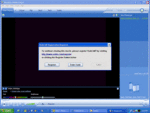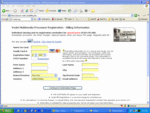Vodei
Vodei is proprietery multimedia container based on the AVI format. A product known as Vodei Multimedia Processor, which is avilable for Microsoft Windows from http://www.vodei.com, is the only known way of displaying or converting Vodei files. These files consist of three parts: a standard compliant AVI video which is displayed when Vodei MP is not installed, a specially encoded/encrypted/formated video which plays when the appropriate software is installed, and a small amount of control data.
Playback and Conversion using Vodei Multimedia Processor
When installed on any compatible system (Windows 98+), Vodei Multimedia Processor acts as a DirectShow filter splitter for Vodei files. The software reads the files, extracts the audio/video and passes is on to the codecs installed on the system for decoding. Once decoded, the data can be displayed in any DirectShow media player such as Windows Media Player. It is also possible to transcode the content in Vodei files using any application capable of using DirectShow as an input. As always, transcoding to lossy format will result in a loss in quality. Vodei MP uses the DirectShow merit system to pass any non Vodei files to the next highest priority compatible splitter on the system - as such, the software should have no impact on non Vodei files.
When Vodei MP is not installed, only the standard AVI compliant portion of the file can be opened. Both audio/video portions can be encoded using any codec and be of any length but many files found in the wild contain a short video encoded with Microsoft RLE, directing the viewer to download the software, and a longer video encoded with a MPEG-4 codec.
File Format and Purpose
According the official website, "Vodei makes possible the storage of higher quality content in smaller files and the faster transmission of multimedia files over file distribution networks." The website does not explain how this is done.
If one is to assume that the only part that the viewer is interested in is PartB (the specifically encoded part) then a typical Vodei file contains about 2MB of "useless" data and using this format actually increases the file size. It is, however, PartA that informs the viewer what the required software is (both Vodei MP and the audio/video codecs) as opposed to letting the viewer figure it out on their own. A computer newbie left on their own to figure out codec related things is a waste of their time and a danger to their computer; as such, the extra 2MB is well worth a few seconds of extra downloading time. The file size reduction (if exists) may be due to the way PartB is stored but this can't be determined conclusively since the size of the original data is unknown and the Vodei encoder is not public available. It is safe to say that there are both less efficient and more efficient methods - with their own upsides and downsides - of storing Vodei equivalent multimedia quality.
A faulty assumption is that the only way to increase data transmission speeds is reducing the size of the data; this can be illustrated using a real world analogy. When driving from point A to point B, taking a 4 lane highspeed highway may involve traveling a greater distance but would still take less time than taking small streets with multiple stop signs and traffic lights. Similarly, it is possible, using the right system, to increase transmission speeds and reduce download time while also increasing the file size. Vodei could, in theory, improve download times by utilizing an encoding algorithm specially suited for one (or a set of) file distribution network or running a CDN.
It has been proposed that Vodei is designed for copyright protection but this is unlikely since the software places no restrictions on playback or conversion. The FAQ appears to indicate that the software is financed through license fees charged to publishers but it has also been suggested, on Internet forums, that Vodei MP is sold using the shareware model.
Marketing Method
The advertising strategy for the software is three-pronged. The majority of users that learn of Vodei Multimedia Processor do so by downloading a file encoded with the container. As stated before, viewing the file without the software merely displays an ad to the software maker where it is advertised as a free download. The user can then download the software and install it. After an extended amount of use, the software might open a dialog box (pictured right) asking the viewer to register the software. Upon typing in the users machine number in the registration page, the site transfers the user to another page asking for payment information (pictured lower right).
Safety
Unfortunately with the prevalence of spyware, viruses, and malware on the Internet these days, it has become natural for people to become suspicious of Internet downloads. This section applies only to Vodei MP version 2.00 downloaded from the official website [1]. Caution should be used when installing older, newer, cracked, hacked, or pirated versions as they may behave differently.
The first concern, despite denials by the creators, is that Vodei MP is allegedly spyware that uses the Internet to communicate and report information about the user's computer and behavior (such as what media files are viewed) to the author, government, content owner, or some other third party. Vodei MP has been tested and worked as described on Windows 98, Windows 2000, Windows XP and Windows Vista with no Internet connection. Once the systems were connected to the Internet and traffic analyzed using a packet sniffer, Vodei MP did not attempt to connect to the Internet over a period of 72 hours. Vodei MP does load some Windows libraries related to networking but these have many other uses, such as internal local communication, besides connecting to the Internet. Since the software never connects to the Internet, it is not possible for it to be spyware because it never sends any information to anyone.
Vodei MP does not modify any multimedia files and it does not modify any system data or registry entries which are not necessary for proper playback of Vodei files. The included uninstaller undoes all changes made to the Windows Registry during installation and removes all files created during installation, with one exception. Due to limitations in Microsoft Windows preventing the deletion of files which are in use, in some cases some DLL files will remain in the installation directory; these files are completely harmless and can be easily deleted after restarting the computer.
The conclusion is that any unexpected behavior (none of which appeared during this test) exhibited by Vodei MP is due to an unintentional conflict with other software or a bug; this should of course be reported to the distributor.
External links
- Vodei Multimedia Processor - Higher Quality Movies, Faster Downloads - Official website
- Web Safety Ratings from McAfee SiteAdvisor - Automated impartial safety analysis for the Vodei website and software
- exposing vodei - An incomplete investigation of Vodei


